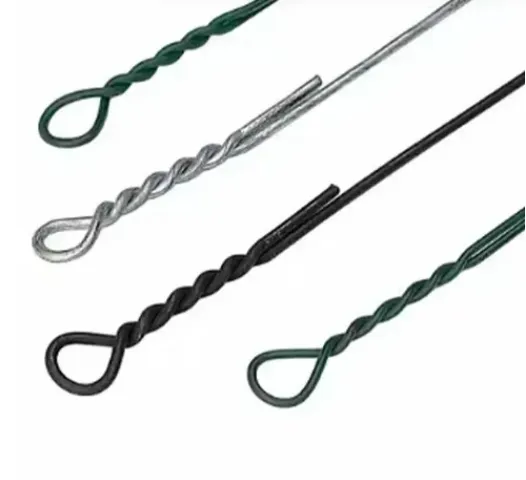-
 هاتف:
هاتف: -
 بريد إلكتروني:
بريد إلكتروني:

Built to Bind: The Strength and Versatility of Baling Wire for Every Industry
In industries where bundling, compressing, and securing materials is routine, one product proves indispensable: baling wire. Whether used in recycling plants, agricultural operations, packaging warehouses, or shipping centers, this durable wire delivers reliability, strength, and consistency. From understanding how to store and size it to sourcing the best quality options from trusted baling wire manufacturers, it’s essential to know what sets high-grade baling wire for sale apart. With rising demand across sectors, now is the perfect time to discover why this product remains a top-choice solution for heavy-duty fastening needs.

Why Choose Baling Wire? Unpacking Its Core Advantages
Baling wire is renowned for its simplicity and strength. Designed to hold together heavy bundles of paper, cardboard, hay, textiles, and more, this industrial wire resists breakage, twisting, and kinking—even under intense pressure. Its performance remains reliable whether used with automatic balers, hand-tying tools, or in customized packaging systems.
One of the standout features is its flexibility: while strong enough to contain dense bales, baling wire can still be bent, looped, and twisted without losing integrity. For added protection, galvanized baling wire includes a corrosion-resistant zinc coating, extending its usability in humid or outdoor environments. This makes it particularly useful in agriculture and recycling sectors where exposure to moisture is common.
Its ability to meet both light-duty and heavy-duty demands across multiple industries proves why baling wire continues to outperform less durable alternatives like rope, plastic, or fabric strapping.
سلك بالات:Choosing the Right Size and Strength for Your Needs
Selecting the correct wire size and tensile strength is key to getting the most from any baling wire application. The wire gauge directly influences strength—thicker gauges like 11 or 12 are ideal for heavy loads, while thinner gauges such as 14 or 16 are suited to lighter baling requirements.
Industrial buyers looking for reliable baling wire for sale should consider both the baling equipment used and the weight and type of material being baled. For example, compact cardboard or aluminum may require different tension strength than loose textiles or hay. Custom sizing from established baling wire manufacturers ensures that the wire performs safely and efficiently under real-world pressure.
Galvanized baling wire is often the preferred choice when strength and long-term exposure are concerns, thanks to its combination of durability and rust protection. Working with experienced suppliers guarantees not only the right specification but also consistent coil length and packaging to support faster workflows.
سلك بالات:Smart Storage Solutions to Extend Wire Life
To preserve the quality and performance of baling wire, proper storage is critical. Wire exposed to moisture, chemicals, or extreme temperatures may weaken or corrode over time—especially if left unprotected. That's why it's recommended to keep all baling wire in a clean, dry storage area, preferably indoors and off the ground.
Using covered reels or sealed containers prevents contamination and tangling, reducing downtime during high-output baling operations. In the case of galvanized baling wire, while it offers corrosion resistance, protective storage still extends its life and ensures a smooth feed into balers.
Leading baling wire manufacturers often provide coiled or boxed options that simplify storage and handling. Whether it’s warehouse shelving or mobile storage carts, organized setups protect your investment and maintain operational efficiency.
Sourcing Matters: Working with the Right Baling Wire Manufacturers
Not all wires are created equal. Choosing premium-grade wire from reputable baling wire manufacturers makes a noticeable difference in performance, safety, and reliability. These suppliers use precision drawing processes and quality materials to ensure consistent diameter, strength, and coating thickness across every batch.
Buyers searching for baling wire for sale should look for manufacturers who offer customization, technical support, and fast delivery. In today’s market, versatility is key—many suppliers now offer both black annealed and galvanized baling wire, in various gauges and packaging formats to meet industry-specific needs.
When businesses compare baling wire price, it’s important to weigh cost against long-term value. Cheap, inconsistent wire can lead to breakage, machine jams, and productivity loss. Investing in high-quality baling wire from trusted sources reduces overall costs by improving efficiency and minimizing material waste.
Baling Wire FAQs
How should I store baling wire to prevent damage?
Baling wire should be stored in a dry, covered area away from moisture and chemicals. Keep it off the ground and in sealed containers or reels to prevent rust, tangling, and contamination.
What are the benefits of using galvanized baling wire over standard wire?
Galvanized baling wire offers superior corrosion resistance, making it ideal for outdoor or humid environments. It has a longer service life and ensures consistent performance even under harsh conditions.
How do I choose the right size of baling wire for my needs?
The choice depends on the material being baled and the type of baler used. Heavier materials require thicker gauges (like 11 or 12), while lighter loads may use thinner gauges (14 or 16).
Are there affordable options when searching for baling wire for sale?
Yes. Many reputable suppliers offer competitive baling wire price points, especially when purchased in bulk. Cost-effective options are available without sacrificing quality or performance.
Why is it important to source from established baling wire manufacturers?
Working with trusted baling wire manufacturers ensures consistency, strength, and safety. They offer quality control, customization, and faster delivery—key factors for maintaining operational efficiency.
-
Versatile Protection with Hexagonal Wire MeshأخبارJul.14,2025
-
Smart and Strong Security Solutions with Chain Link FenceأخبارJul.14,2025
-
Safeguarding Mountainsides with Premium Rockfall Protection NettingأخبارJul.14,2025
-
Reliable and High-Strength Solutions with Baling Wire for SaleأخبارJul.14,2025
-
Leading the Industry: Innovative Security Solutions with Barbed WireأخبارJul.14,2025
-
Efficient and Durable Fastening with Premium Loop Tie WireأخبارJul.14,2025
-
Uncompromised Slope Safety with Advanced Rockfall Protection NettingأخبارJun.09,2025








